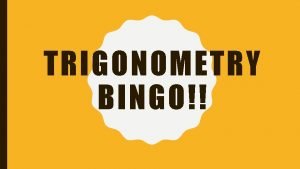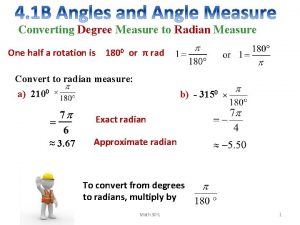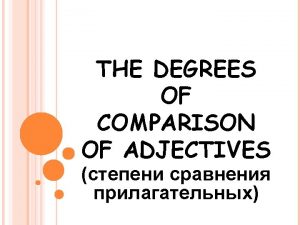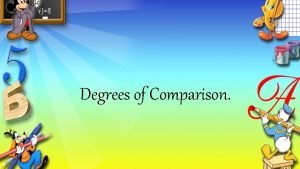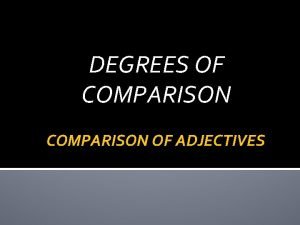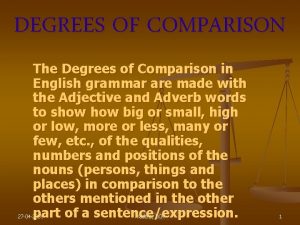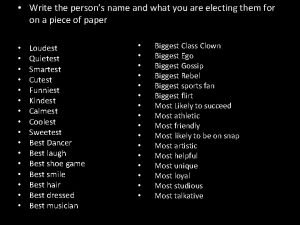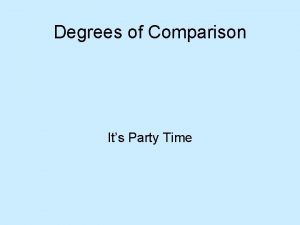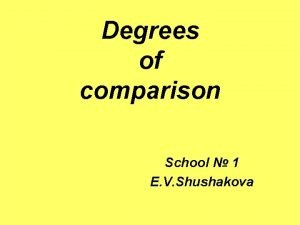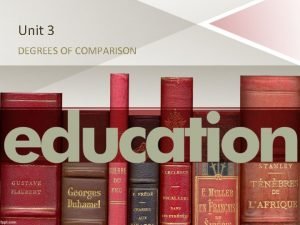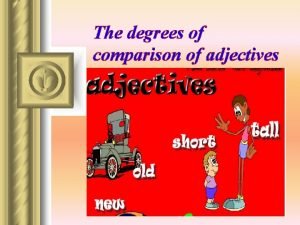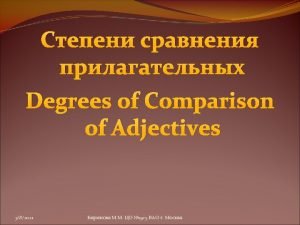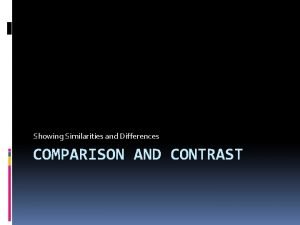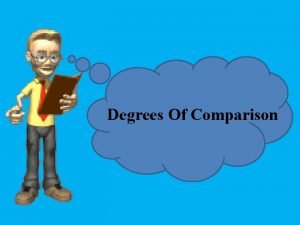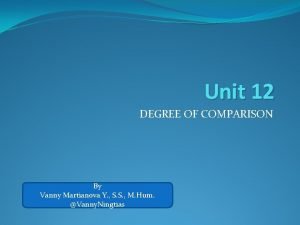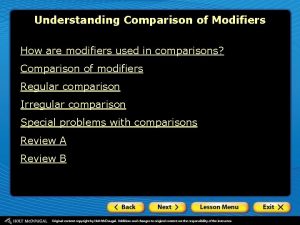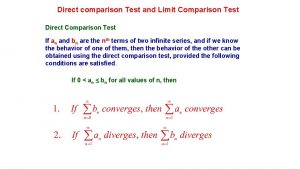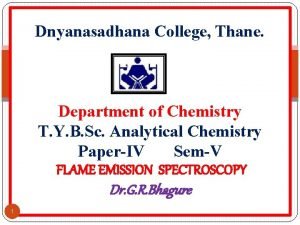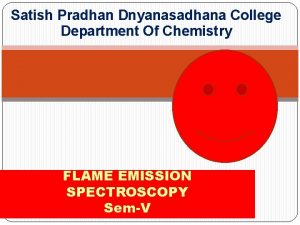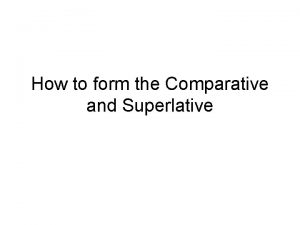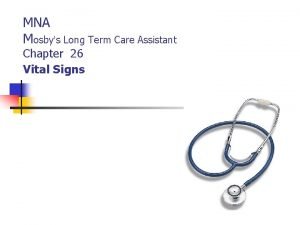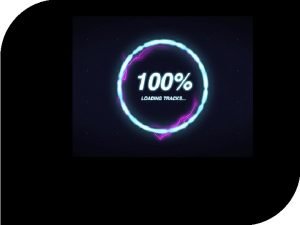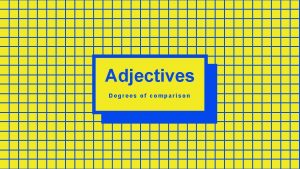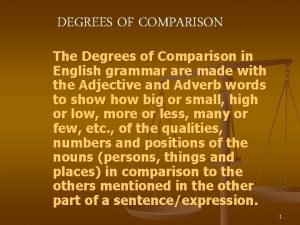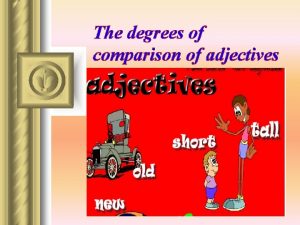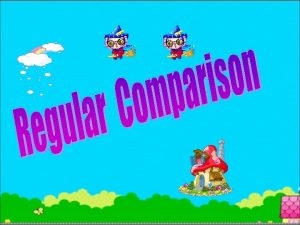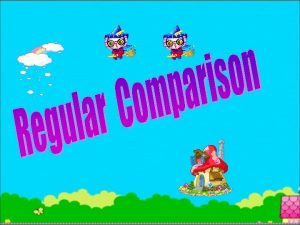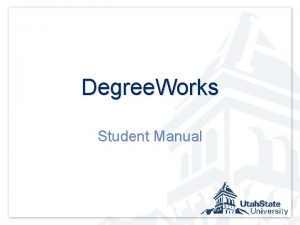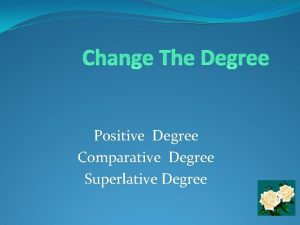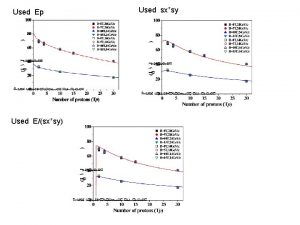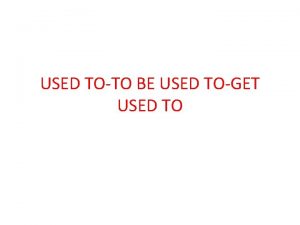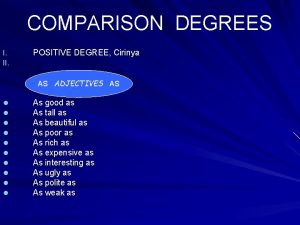Comparison Degree Degrees of Comparison are used when


























- Slides: 26

Comparison Degree

Degrees of Comparison are used when we compare person or thing with another.

Degrees of Comparison are used when we compare one person or one thing with another. There are three Degrees of Comparison : 1. Positive degree. 2. Comparative degree. 3. Superlative degree.

Positive Degree When we speak about only one person or thing, we use the Positive degree.

Positive Degree When we speak about only one person or thing, we use the Positive degree. Examples: • This house is big. • He is a tall student. • This flower is beautiful. • He is an intelligent boy.

• • This house is as big as that house Orchids are as beautiful as Roses Dina is as tall as Nadya Noni’s hair is as long as Nadya’s.

Comparative Degree is used when we compare two persons or two things with each other with greater intensity of adjective.

Comparative Degree is used when we compare two persons or two things with each other with greater intensity of adjective. Examples: • This house is bigger than that one He is smarter than his brother • He is more intelligent than that boy • Rose is more beautiful than Jasmine •

Superlative Degree is used when we want to compare more than two persons or things and to show the greatest intensity of adjective.

Superlative Degree is used when we want to compare more than two persons or things and to show the greatest intensity of adjective. Examples: • This house is the biggest house in the block. • He is the most intelligent student in the class. • Rose is the most beautiful girl.

You need to know… • Adjectives with one syllable use endings –er/-est positive comparative superlative cleaner cleanest faster fastest bigger biggest harder hardest

You need to know… • Adjectives with more than two syllables use more- /mostpositive comparative superlative expensive more expensive most expensive beautiful more beautiful most beautiful difficult more difficult most difficult

You need to know… • There are some irregular adjectives: positive comparative superlative good better best bad worse worst much/many more most farther/further farthest/furthest little less least

You need to know… There are some adjectives that have two possible forms of comparison : Clever Common Likely Pleasant Polite Quiet Simple Stupid Subtle Sure

1) old Exercise

1) old - older - oldest 2) bad Exercise

1) old - older - oldest 2) bad - worse - worst 3) difficult Exercise

Exercise 1) old - older - oldest 2) bad - worse - worst 3) difficult - more difficult - most difficult 4) large

Exercise 1) old - older - oldest 2) bad - worse - worst 3) difficult - more difficult - most difficult 4) large - larger - largest 5) good

Exercise 1) old - older - oldest 2) bad - worse - worst 3) difficult - more difficult - most difficult 4) large - larger - largest 5) good - better - best 6) big

Exercise 1) old - older - oldest 2) bad - worse - worst 3) difficult - more difficult - most difficult 4) large - larger - largest 5) good - better - best 6) big - bigger - biggest 7) easy

Exercise 1) old - older - oldest 2) bad - worse - worst 3) difficult - more difficult - most difficult 4) large - larger - largest 5) good - better - best 6) big - bigger - biggest 7) easy - easier - easiest 8) much

Exercise 1) old - older - oldest 2) bad - worse - worst 3) difficult - more difficult - most difficult 4) large - larger - largest 5) good - better - best 6) big - bigger - biggest 7) easy - easier - easiest 8) much - more - most 9) little

Exercise 1) old - older - oldest 2) bad - worse - worst 3) difficult - more difficult - most difficult 4) large - larger - largest 5) good - better - best 6) big - bigger - biggest 7) easy - easier - easiest 8) much - more - most 9) little - less - least 10) interesting

Exercise 1) old - older - oldest 2) bad - worse - worst 3) difficult - more difficult - most difficult 4) large - larger - largest 5) good - better - best 6) big - bigger - biggest 7) easy - easier - easiest 8) much - more - most 9) little - less - least 10) interesting - more interesting - most interesting

go to next exercise
 Insidan region jh
Insidan region jh Convert from degrees to radians 225 degrees
Convert from degrees to radians 225 degrees One half radian
One half radian Rough degrees of comparison
Rough degrees of comparison Comparative adjectives исключения
Comparative adjectives исключения Degrees of comparison
Degrees of comparison Adjective degree
Adjective degree Rough degrees of comparison
Rough degrees of comparison Definition of degrees of comparison
Definition of degrees of comparison Eager degrees of comparison
Eager degrees of comparison Slim degrees of comparison
Slim degrees of comparison High degrees of comparison
High degrees of comparison Untidy degrees of comparison
Untidy degrees of comparison Limang antas
Limang antas Degree of comparison of merry
Degree of comparison of merry Degree of comparison
Degree of comparison Italre
Italre Adjectives er/more the eat/the most
Adjectives er/more the eat/the most Degree modifiers examples
Degree modifiers examples Direct comparison test
Direct comparison test Example of simile sentence
Example of simile sentence Pairwise comparison chart
Pairwise comparison chart In a premix burner used in fes the fuel used is
In a premix burner used in fes the fuel used is In a premix burner used in fes the fuel used is
In a premix burner used in fes the fuel used is Comparative of tall
Comparative of tall Six degrees social media
Six degrees social media Thermometer 97 degrees
Thermometer 97 degrees

